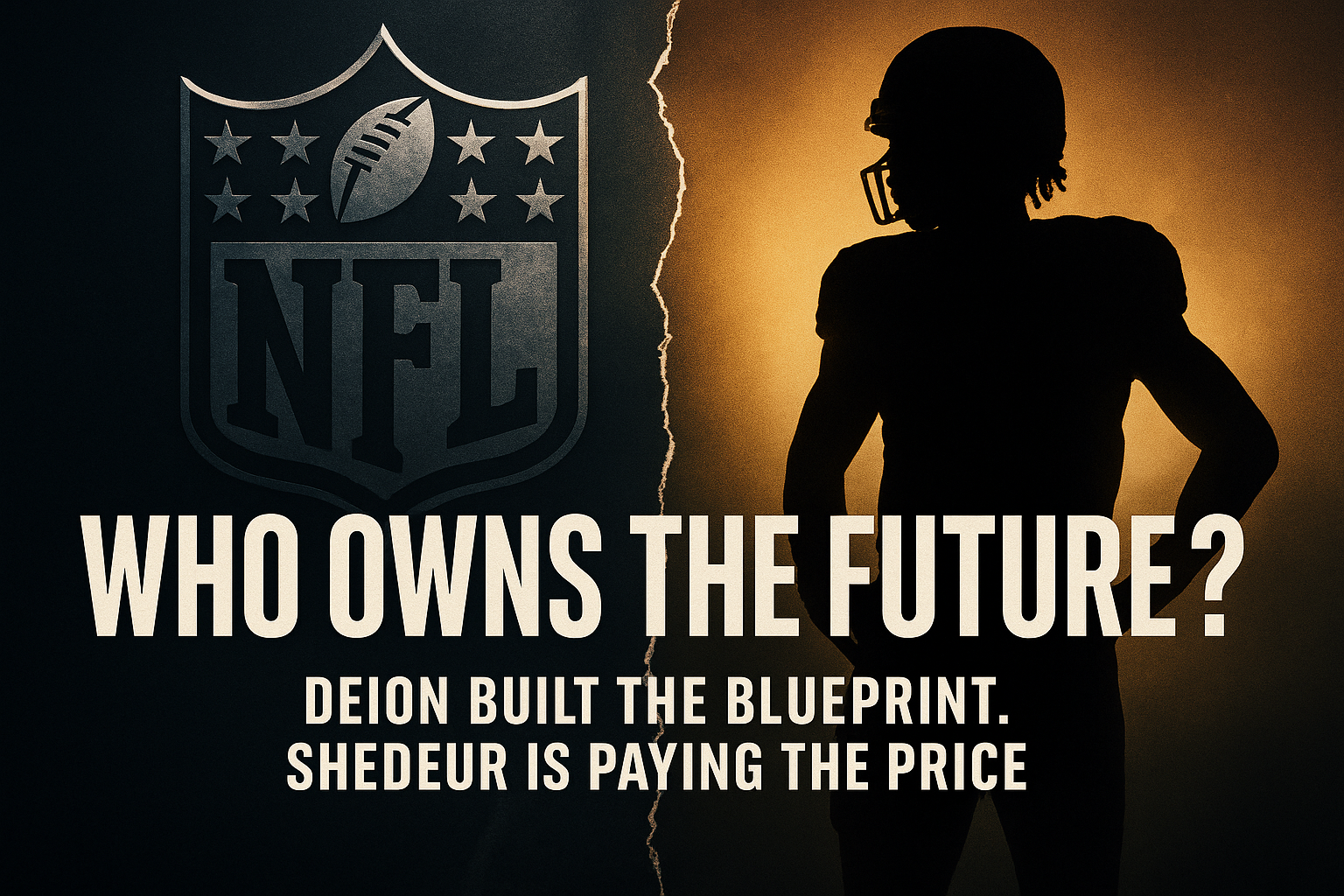From Prime Time to Draft Time

By Jaron Baston, Commissioner, LAW Fund
Deion Built the Blueprint. Shedeur Is Paying the Price.
In professional sports, true disruption rarely goes unnoticed, and it is rarely left unpunished.
Deion Sanders, better known to the world as "Prime Time," wasn't simply a Hall of Fame athlete. He was a shift. A force of personality so undeniable that it challenged not just defenders on the field, but the unspoken rules of a conservative league off of it.
He wore gold chains during games.
He dictated terms to franchises.
He leveraged his brand before the word "brand" was common vocabulary in sports.
Deion refused to be contained — and in doing so, he opened doors that today’s athletes walk through without even realizing it.
But systems rarely forget disruption.
They remember.
And they recalibrate.
Today, it is Deion’s son, Shedeur Sanders, who bears the weight of that recalibration.
A Father’s Blueprint, A Son’s Battle
Projected as a first-round NFL Draft pick based on performance, leadership, and pedigree, Shedeur Sanders watched as his name fell into the fifth round.
He didn’t fall because he lacked talent.
He fell because he moved differently.
- He treated NIL as a platform for ownership, not just a paycheck.
- He made it clear he would choose the right fit, not just accept any opportunity.
- He carried himself like a CEO, not a recruit.
And to a system built on control, independence looks like defiance. To many teams, this was not just confidence — it was a perceived threat to the traditional hierarchy of the NFL.
The system remembered Prime Time.
And the system responded to Prime Legacy.
The Cost of New Power
This is not a story of individual failure.
It is a story of generational resistance.
Deion Sanders was never simply an athlete.
He was an agent of change, cloaked in charisma.
He embodied the scripture he so often quotes: "To whom much is given, much is required."
And there is a deeper, familiar pattern here:
In sports, strong Black fathers are often framed as problems, not protectors.
- Richard Williams was ridiculed long before Venus and Serena ruled the courts.
- LaVar Ball was painted as a distraction before his sons became NBA stars.
- Deion Sanders was doubted even after revolutionizing what it meant to be a multi-sport, multi-brand athlete.
When Black fathers advocate boldly for their children, when they dare to coach, guide, and shield them publicly, the media doesn’t celebrate it. It vilifies it.
Shedeur wasn't punished for being arrogant. He was made a loud example of all the shield's power, for walking with the same visible, unapologetic protection his father once displayed.
The NFL doesn't just react to talent.
It reacts to memory.

Faith, Sacrifice, and the Weight of Legacy
Deion Sanders speaks openly about God’s hand on his journey.
He has never shied from declaring that his steps, both celebrated and criticized, are divinely ordered.
Is it possible that the very drop Shedeur endured was orchestrated not for embarrassment, but for elevation?
That what looks like a financial loss today could be setting the stage for something infinitely larger?
There is precedent for this — both biblically and historically:
- Joseph was betrayed for dreaming beyond the limits others placed on him, but the pit was just a hallway to the palace.
- David was anointed long before he was appointed, overlooked by men but crowned by destiny.
- Even Jesus was rejected in his town, not because he lacked truth, but because he carried too much of it for the small minds around him.
Disruption demands isolation before elevation.
And favor almost always walks through rejection first.
In this light, Shedeur’s journey isn’t a setback.
It’s a setup.
Not for the applause of today, but for the kingdom influence that tomorrow will require. Not just for personal vindication, but for a restructuring of how athletes, especially young Black athletes, see themselves:
Not as replaceable pieces.
But as irreplaceable institutions.
The Weight of a Name on the Biggest Stage
This wasn’t just any draft.
This wasn’t just any prospect.
This was a legacy family, father to son, stepping onto the biggest stage in American sports.
The NFL Draft isn’t just a moment. It’s a rite of passage under the brightest lights. It's a national ceremony.
And when Shedeur Sanders stood under those lights, he carried more than his own dreams. He carried the memory of a father who refused to be managed, muted, or marginalized. This wasn’t punishment for who Shedeur was. It was a response to what Deion represents to a nation of athletes.
The reality is simple but sobering:
Dreams on this level are not just judged by performance.
They are judged by history.
Shedeur’s fall in the draft wasn’t just about his interviews or bright swagger.
It was a culmination of a system unsettled by years of Deion's defiance — and now the NFL is confronted by his legacy, his son, who also refuses to walk backwards into tradition.
When Numbers Should Have Spoken Louder
Shedeur Sanders did more than produce elite numbers, he did it while climbing the steepest mountain possible.
After dominating at Jackson State, Shedeur transferred to Colorado and immediately stepped into the spotlight of the Pac-12, one of the most competitive conferences in college football.
He wasn’t protected by a powerhouse roster. In fact, Colorado’s offensive line was statistically one of the worst in Division 1, allowing over 50 sacks during the season, ranking near the bottom nationally.
Despite constant pressure, minimal protection, and playing against NFL-caliber defenses week after week, Shedeur still delivered:
- 74.0% completion rate (elite)
- 4,134 passing yards
- 37 touchdowns to only 10 interceptions
- Top 5 in major statistical categories across the nation
Those aren’t average numbers.
Those are first-round numbers.
Yet despite outperforming many recent first-round picks statistically and situationally, Shedeur’s name wasn’t called until Day 3.
Here’s how Shedeur stacked up against recent first-round quarterbacks:
| Quarterback | Draft Year | Pick | School | Comp % | Yards | TDs | INTs | Concerns |
|---|---|---|---|---|---|---|---|---|
| Shedeur Sanders | 2025 | 144 | Colorado | 74.0% | 4,134 | 37 | 10 | Media narratives, entitlement rumors |
| Cam Ward | 2025 | 1 | Miami | 69.5% | 3,872 | 34 | 12 | None reported |
| Jaxson Dart | 2025 | 25 | Ole Miss | 66.2% | 4,279 | 29 | 9 | None reported |
| Caleb Williams | 2024 | 1 | USC | 66.6% | 4,537 | 42 | 5 | None reported |
| Anthony Richardson | 2023 | 4 | Florida | 53.8% | 2,549 | 17 | 9 | Accuracy, limited starts |
| Trey Lance | 2021 | 3 | North Dakota State | 66.9% | 2,786 | 28 | 0 | Limited experience (FCS level) |
| Jordan Love | 2020 | 26 | Utah State | 61.9% | 3,402 | 20 | 17 | Turnover issues, decision-making |
Performance wasn’t the problem.
Production wasn’t the problem.
Perception was the problem.
Because when power can’t erase your stats, it tries to redefine your story.
The New Playbook: Ownership Over Opportunity
Deion Sanders didn’t just play the game.
He redefined it.
Now, Shedeur has the opportunity to do the same, but not by seeking acceptance into old rooms, but by building new ones.
Today’s athletes must think beyond contracts.
Beyond teams.
Beyond applause.
Structure matters.
Ownership matters.
Legacy matters.
It is no longer enough to be seen.
You must be secured.
Closing Reflection
Shedeur Sanders' draft attack was not an indictment of his ability.
It was a reflection of power grappling with the reality that its influence is fading.
The question is no longer whether athletes will own their narratives.
The question is how they will structure that ownership to endure beyond trends, endorsements, and temporary contracts.
Because true wealth isn’t in visibility.
It’s in governance.
LAW Fund exists to answer that call.
Because the system remembers.
But this time, so do we.

LAW Fund exists to ensure that the structure circulates and wealth is protected. And that every deal an athlete signs is backed by strategy, not just sentiment.


